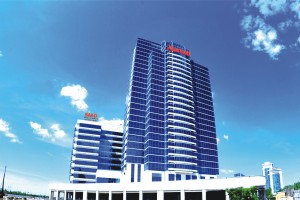 ASTANA – Malaysian Food and Culture week opened at the Aroma Restaurant in Astana’s Marriott hotel on Sept. 23 and will run through Sept. 26, with entertainment, shopping and a changing menu of Malaysian dishes presented each night.
ASTANA – Malaysian Food and Culture week opened at the Aroma Restaurant in Astana’s Marriott hotel on Sept. 23 and will run through Sept. 26, with entertainment, shopping and a changing menu of Malaysian dishes presented each night.
Included in the nightly events, which run from 7 p.m. to 11 p.m., is a Malaysian buffet prepared by visiting Chef Kamaruzzaman Hasan using ingredients flown just for the occasion. Dancers perform traditional – and occasionally audience-interactive – Malaysian dances and a tea master demonstrates the dramatic art of teh tarik, swinging sweet milk tea between metal pails.
Opening the event, Malaysian Ambassador to Kazakhstan Dato’ Hidayat Abdul Hamid said: “We are pleased to note that last year about 20,000 Kazakh tourists went to Malaysia … and we also hope that the number of travellers from Kazakhstan to Malaysia will increase, as well as the number from Malaysia to Kazakhstan. We are always ready to expand our good cooperation in all sectors, including tourism promotion and management, in all aspects of tourism, such as health tourism, adventure tourism, education, as well as Islamic tourism. We hope that we will enhance the good relations between Malaysia and Kazakhstan.”
Executive Secretary of the Ministry for Investment and Development Beibut Atamkulov, a former ambassador to Malaysia, officially cut the ribbon to open the event. Malaysia is a high priority country for Kazakhstan today, he told the assembled guests, and Kazakhstan aspires to its massive tourism success of 26 million visitors per year. He praised the country’s rapid development in technology, infrastructure and education in particular.
“I hope this week will allow you to comprehend the spirit of Malaysia through its food, as this is a unique, interesting and spicy country – you have to try it,” he said.
Discussing his menu, Chef Hasan said he had toned down some of his Malaysian food’s usual spiciness to appeal to Kazakh palates. “My favourite dish is roti canai [a type of flaky, moist flatbread],” he said. “It’s something that, if you talk about Malaysia, this is what you mean. You eat it for breakfast every morning.” All of Malaysia’s many ethnic groups are united in eating roti canai, he said.
Ambassador Hamid said the week had been organised because “Food and culture – those are the characteristics … for forging good relations and giving a good impression of your country, and I think there’s a lot that we can share with other communities and other cultural traditions.”
The food and culture week is a tease for those who don’t know much about Malaysia, to attract them to learn more and perhaps come visit, he said. Kazakhs, he added, are very good tourists, spending a relatively long time in the country when they visit. Visitors from Kazakhstan make up the bulk of Central Asian tourism to Malaysia.
One of the tourism sectors they are most interested in promoting right now is medical tourism, the ambassador said. “[Visitors] can get very good treatment in Malaysia; there are very, very good hospitals.” A special Malaysian Health Tourism Council now promotes medical tourism, and health screening is one of the council’s main programmes – encouraging leisure tourists to take the opportunity for a general screening, with results delivered within a day, Hamid says.
“There’s so much we can work on, not just with the Kazakh public but also with officials. We would like to have more collaboration, exchange of medical expertise and training in all fields, including tourism. We can learn from each other’s experience and we can share with our friends.”

